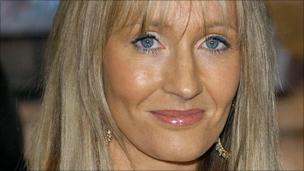JK Rowling gives £10m for Edinburgh MS centre
- Published

JK Rowling's mother died from complications related to MS
Author JK Rowling has donated £10m to the University of Edinburgh to set up a multiple sclerosis research clinic.
The Harry Potter writer, whose mother Anne had the disease and died aged 45, said the funds were to help attract top researchers to seek a cure for MS.
The Anne Rowling Regenerative Neurology Clinic will aim to put patients at the heart of the research process.
Rowling stood down as patron of the MS Society Scotland last year saying the charity was split by internal rows.
Work at the new clinic will also focus on other degenerative neurological conditions, including Alzheimer's, Parkinson's disease, Huntington's disease and Motor Neurone Disease.
Multiple sclerosis affects about 100,000 people in the UK, while Scotland has one of the highest rates of MS in the world, with some 10,500 people with the condition.
Ms Rowling said: "I cannot think of anything more important, or of more lasting value, than to help the university attract world-class minds in the field of neuroregeneration, to build on its long and illustrious history of medical research and, ultimately, to seek a cure for a very Scottish disease."
She added: "I have just turned 45, the age at which my mother, Anne, died of complications related to her MS.
"I know that she would rather have had her name on this clinic than on any statue, flower garden or commemorative plaque, so this donation is on her behalf, too; and in gratitude for everything she gave me in her far-too-short life."
The clinic will be based in a purpose-built facility at the university.
Academics will work closely with researchers studying neurodegenerative disorders already based at the university, as well as training a new generation of researchers.
The university set up a Centre for Multiple Sclerosis Research in 2007, which has also received support from Rowling.
Professor Charles ffrench-Constant, the centre's co-director, said: "We can only find improved treatments if we can truly understand diseases and the biological processes behind them.
"The Anne Rowling Regenerative Neurology Clinic will enable us to carry out studies that can inform laboratory research and, in turn, this knowledge can be translated back into treatments for patients."